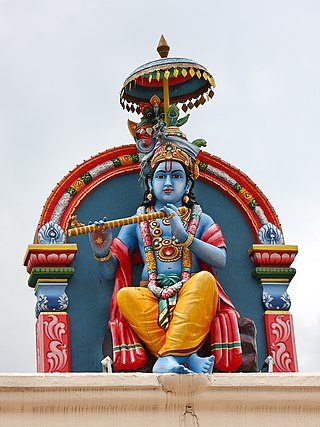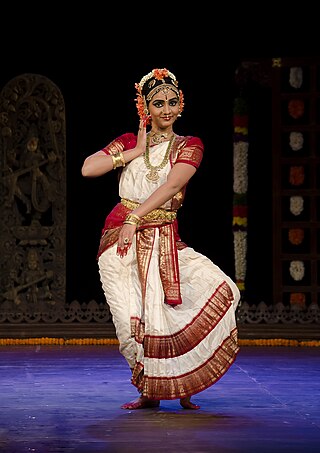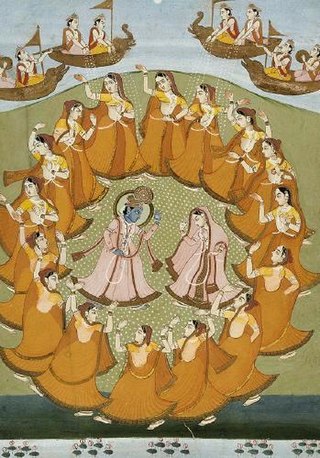See also
- Gopi Kishan, a 1994 Indian film
- Gopi Krishna Nema, Indian politician
- Gopi Krishnan, Indian educationist
Gopi Krishna may refer to:

Krishna is a major deity in Hinduism. He is worshipped as the eighth avatar of Vishnu and also as the Supreme God in his own right. He is the god of protection, compassion, tenderness, and love; and is widely revered among Hindu divinities. Krishna's birthday is celebrated every year by Hindus on Krishna Janmashtami according to the lunisolar Hindu calendar, which falls in late August or early September of the Gregorian calendar.

Radha, also called Radhika, is a Hindu goddess and the chief consort of the god Krishna. She is the goddess of love, tenderness, compassion, and devotion. In scriptures, Radha is mentioned as the avatar of Lakshmi and also as the Mūlaprakriti, the Supreme goddess, who is the feminine counterpart and internal potency of Krishna. Radha accompanies Krishna in all his incarnations. Radha's birthday is celebrated every year on the occasion of Radhashtami.

Kuchipudi is one of the eight major Indian classical dances. It originates from a village named Kuchipudi in the Indian state of Andhra Pradesh. Kuchipudi is a dance-drama performance, with its roots in the ancient Hindu Sanskrit text of Natya Shastra. It developed as a religious art linked to traveling bards, temples and spiritual beliefs, like all major classical dances of India.

Gopi or Gopika in Hinduism are worshipped as the consorts and devotees of Krishna within the Vaishnavism and Krishnaism traditions for their unconditional love and devotion (Bhakti) to god Krishna as described in the Sanskrit scriptures like Bhagavata Purana and other Puranic literature. Gopis are often considered as the expansion of goddess Radha, the chief consort of Krishna. The Raslila of gopis with Krishna has inspired various traditional performance art forms and literatures.

Gopi Krishna was an Indian yogi, mystic, teacher, social reformer, and writer. He was one of the first to popularise the concept of Kundalini among Western readers. His autobiography Kundalini: The Evolutionary Energy in Man, which presented his personal account of the phenomenon of his awakening of Kundalini,, was published in Great Britain and the United States and has since appeared in eleven major languages. According to June McDaniel, his writings have influenced Western interest in kundalini yoga.
Lalita or Lalitha may refer to:

Manipuri dance, also referred to as the Manipuri Raas Leela, is a jagoi and is one of the major Indian classical dance forms, originating from the state of Manipur. It is one of the greatest cultural achievements of the traditional Vaishnavism adhering Meitei people of Manipur. Owing to the Meitei civilization, the classical dance form, first formally developed by Meitei Hindu king Ching Thang Khomba of the Kingdom of Manipur, is considered to be the highest spiritual expression of the worship of Hindu deity Krishna. Owing to its huge influences on the diverse cultural heritages across the Indian subcontinent, it is recognised by the Sangeet Natak Akademi of the Ministry of Culture of the Government of India as one of the few primary classical dance forms of the Republic of India, and is honoured with the Sangeet Natak Akademi Award for Manipuri annually. It is referred to as the "national dance" during the Armenia-India joint issue of postage stamps, as a part of the Armenia-India international relations.

Jhanak Jhanak Payal Baaje is a 1955 Indian Hindi-language dance film directed by V. Shantaram. It stars Shantaram's wife Sandhya and dancer Gopi Krishna in lead roles. One of the earlier Technicolor films made in India, the film won the All India Certificate of Merit for Best Feature Film, the National Film Award for Best Feature Film in Hindi, and the Filmfare Best Movie Award. The film was declared a "Super Hit" at Box office India.

Murari is a 2001 Indian Telugu-language supernatural family drama film written and directed by Krishna Vamsi. The film features Mahesh Babu in the title role along with Sonali Bendre, Lakshmi, Sukumari, Kaikala Satyanarayana, and Gollapudi Maruthi Rao. The film marks Bendre's Telugu debut. Mani Sharma composed the music, while Ram Prasad handled the cinematography. Peter Hein debuted as an action choreographer with this film. The film marked the last on-screen appearance of veteran Telugu actor Dhulipala Seetarama Sastry.

The Raslila, also rendered the Rasalila or the Ras dance, is part of a traditional story described in Hindu texts such as the Bhagavata Purana and Gita Govinda, where Krishna dances with Radha and the gopis of Braj. Rasalila has also been a popular theme for other India classical dances including Bharatanatyam, Odissi, Manipuri Raas Leela, Kuchipudi, and Kathak.

Sivi is a 2007 Indian Tamil-language horror film directed by K. R. Senthil Nathan and starring Yogi, Jayashri Rao and Anuja Iyer. A remake of the 2004 Thai film Shutter, Sivi was released on 21 September 2007 across theatres in Tamil Nadu.
Dasari may refer to:

Manipuri Vaishnavism, also known as Meitei Vaishnavism is a regional variant of Gaudiya Vaishnavism with a culture-forming role in the north-eastern Indian state of Manipur.

Gopi Krishna was an Indian Kathak dancer, actor and choreographer. He also studied Bharatnatyam. In 1952, at the age of seventeen, Gopi Krishna became one of the youngest choreographers in Hindi film history when he was hired to choreograph dances.
Mohnish is a masculine name of Indian origin. The name generally means "Lord Krishna". People with name Mohnish are mainly Hindu by religion.

Buddhimantudu is a 1969 Indian Telugu-language drama film directed by Bapu. It stars Akkineni Nageswara Rao, Vijaya Nirmala, Sobhan Babu and Krishnam Raju, with music composed by K. V. Mahadevan. The film was remade in Tamil as Manidhanum Dheivamagalam (1975) and in Hindi by the same director as Paramaatma (1994).
Vedantam Satyanarayana Sarma (1935–2012), popularly known as Satyam, was an Indian classical dancer and choreographer, considered by many as one of the leading exponents of the classical dance form of Kuchipudi. He was known for his portrayal of female characters such as Usha, Satyabhama, Deva Devi, Mohini, Sasirekha and Gollabhama (Gollakalapam). He was a recipient of several honors including Kalidas Samman, Sangeet Natak Akademi Award and Sangeet Natak Akademi Fellowship. The Government of India awarded him the fourth highest civilian honour of the Padma Shri, in 1970, for his contributions to Dance.
Gopi Krishna is an Indian film editor, who has worked on Tamil language films. He made a breakthrough after his work in Mohan Raja's Thani Oruvan (2015) was well recognised.

Zombie is a 2019 Indian Tamil-language zombie comedy film produced by Vasanth Mahalingam and V. Muthukumar under their production banner S3 Pictures. The film is written and directed by Bhuvan Nullan. Yogi Babu and Yashika Aannand have featured in the lead roles, while Manobala, Gopi, Sudhakar and Anbu Thasan have played pivotal roles. Premgi Amaren has composed the music for the film. This film received highly negative reviews from audiences and critics.
Krishna Leela may refer to: